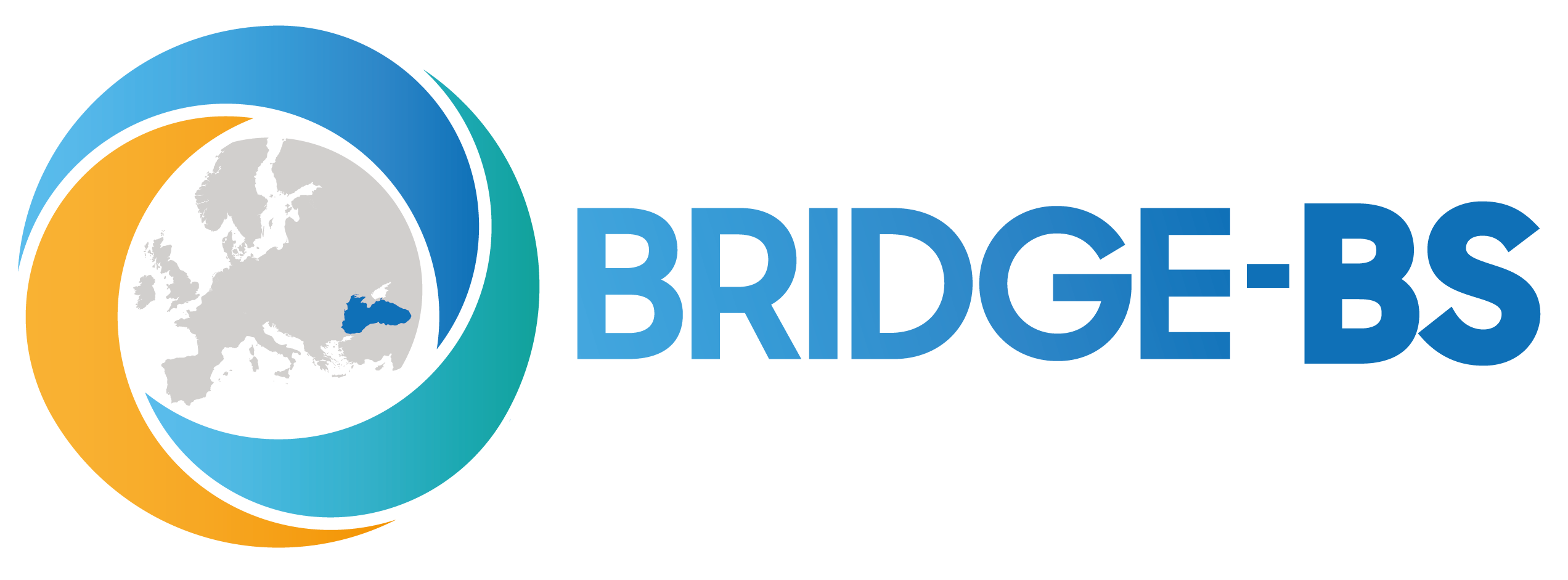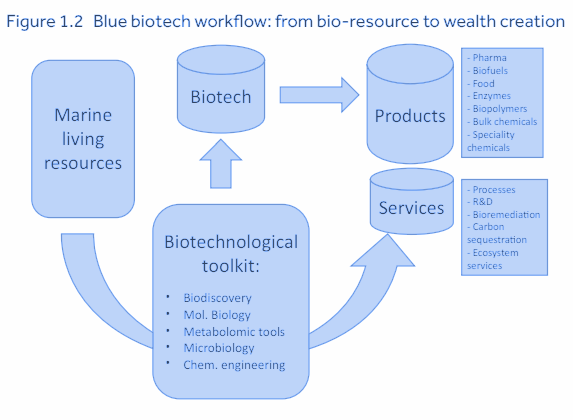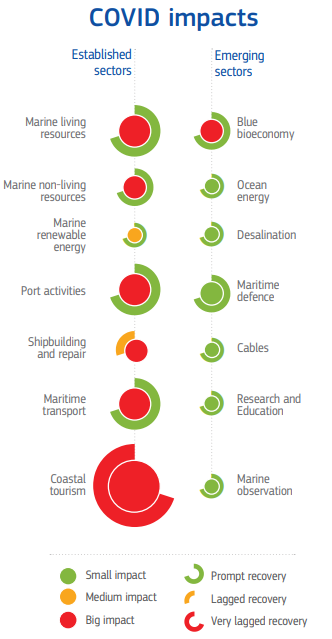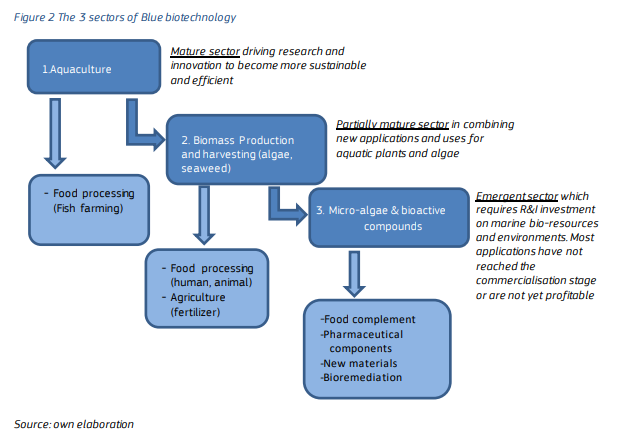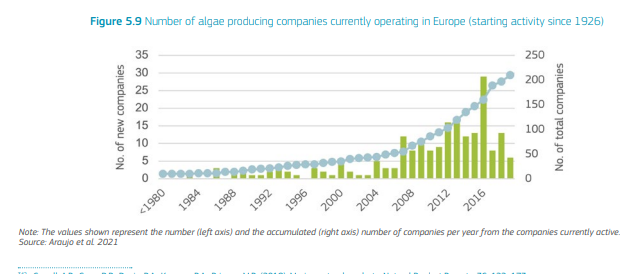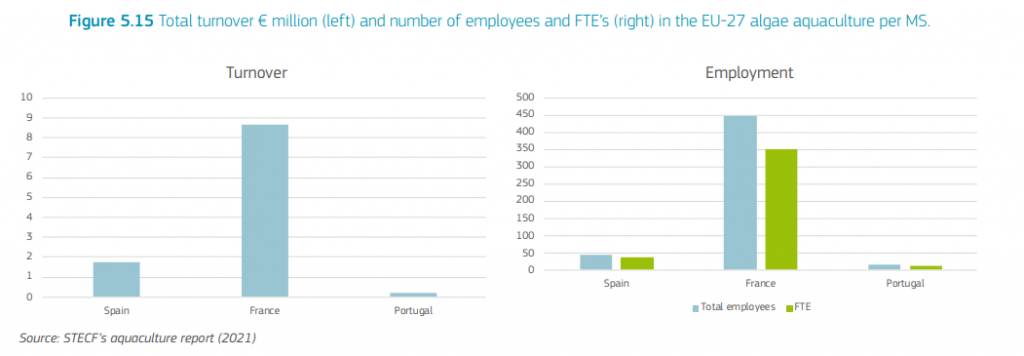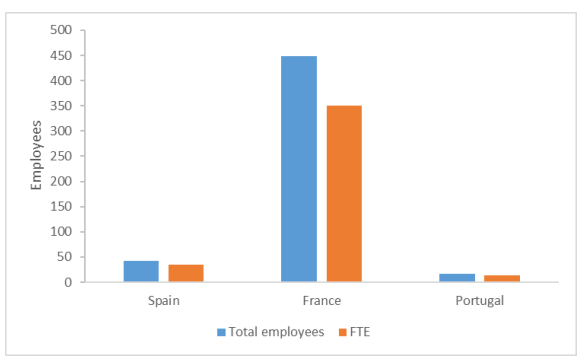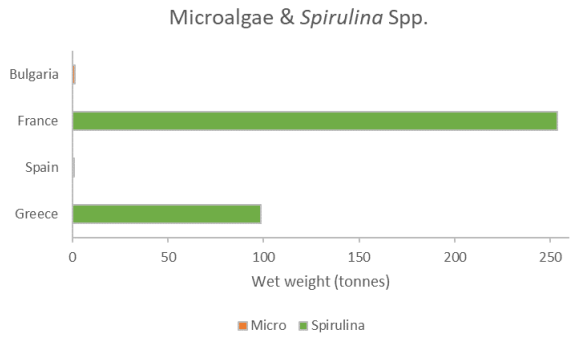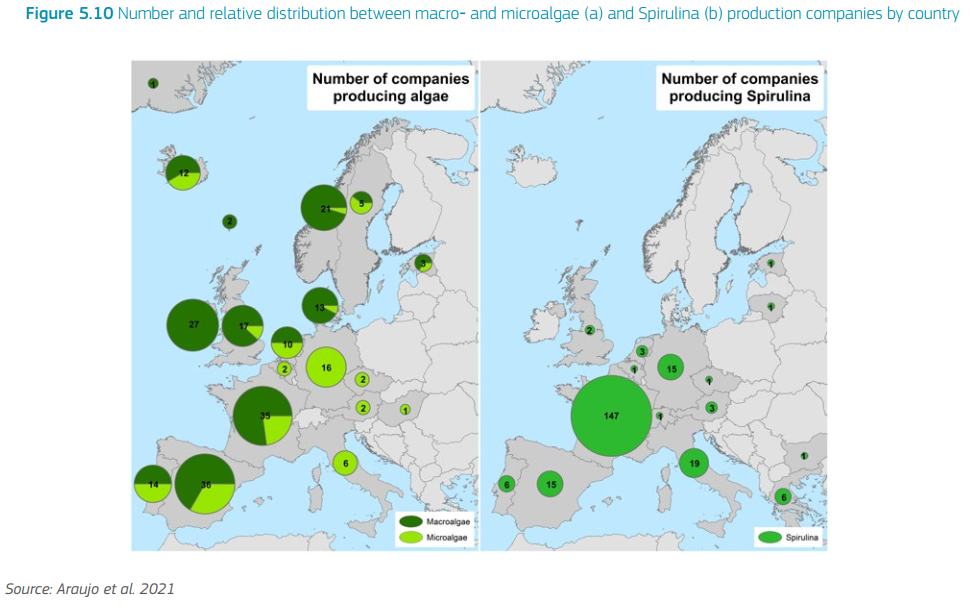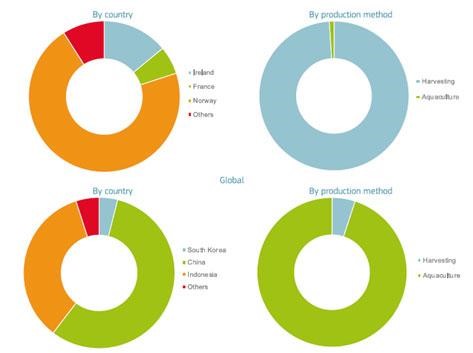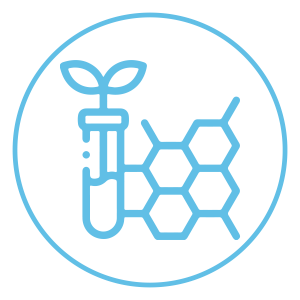
BLUE BIO-TECHNOLOGY
Blue biotechnology is a new and emerging sector. It is closely linked to other sectors, such as fishing and aquaculture, and cooperation between various operators creates favorable conditions for the further development of the sector. Blue biotechnology, or marine biotechnology, is concerned with the exploration and exploitation of marine organisms to develop new knowledge, products, and services in a multitude of fields (OECD, 2016). This exciting sector contributes to the blue bio-economy, turning aquatic biomass into novel foods, feed, energy, packaging, and much more. This includes micro-organisms (microalgae, bacteria, and fungi), algae, and invertebrates (e.g. starfish, sea cucumbers, sea urchins).
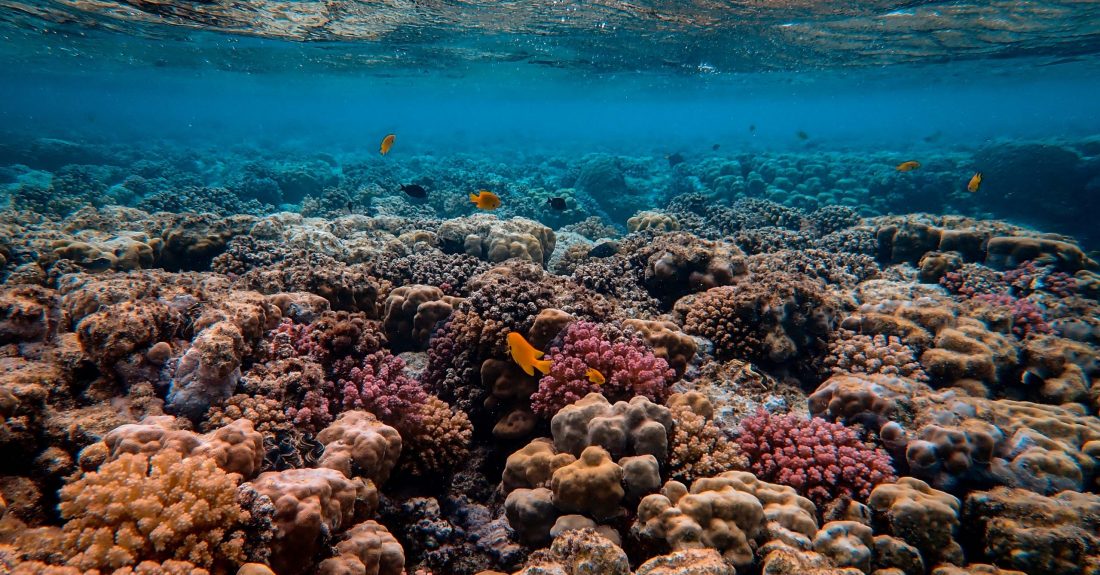
GENERAL INFORMATION
Blue biotechnology is key to realizing the potential of marine bio-resources – a potential that until now remains largely untapped. These resources could produce new products and processes, and help address the global challenges of food, energy, and health.
ECONOMIC VALUE
The companies working in the field of blue biotechnologies are counting on a promising future. For the past ten years, they have been growing very rapidly: 10% per year, according to Sup’Biotech, with a global market that amounted to 3.8 billion euros in 2017*. This growth is strongly driven by a societal demand for natural products and by legislative developments in the field of sustainable development*.
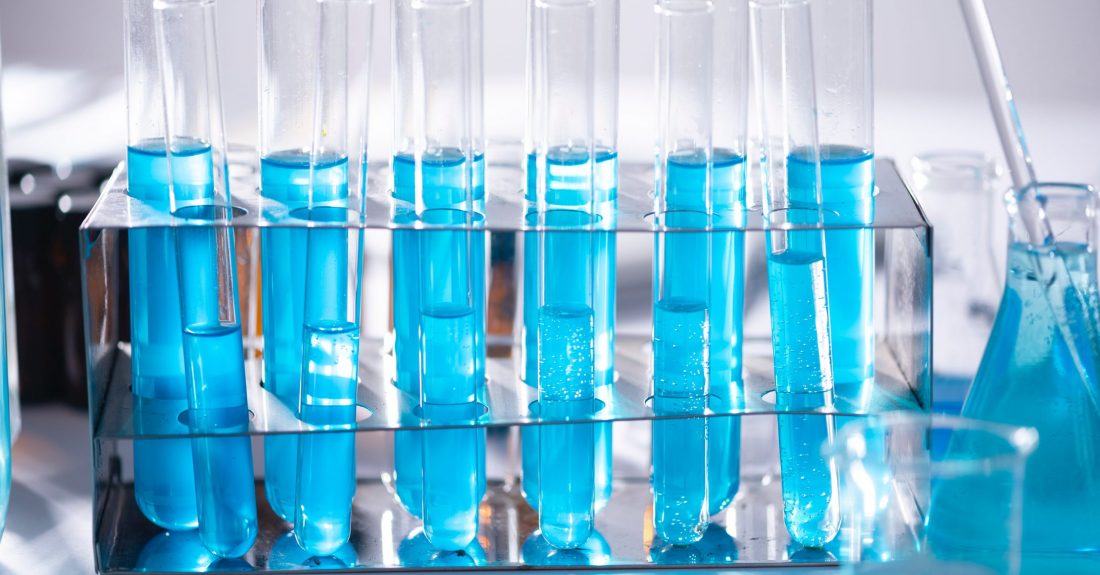
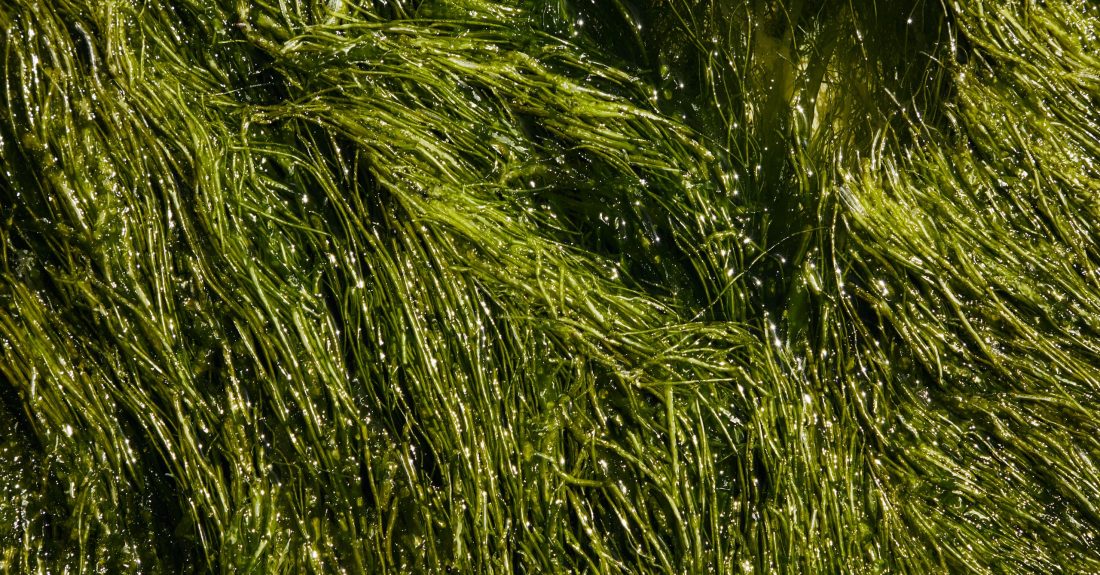
SUB-SECTORS
The European labor market is facing a shortage of specialized and technical skills in Science, Technology, Engineering, and math (STEM) and also challenges due to the changing dynamics brought about by technological change. As a relatively new sector driven by breakthroughs in scientific research, marine biotechnology and related innovation is confronted with such challenges. The sector includes aquaculture, biomass production, and micro-algae compounds sub-sectors.
EXPLORE THE OPPORTUNITIES
Occupation | Description |
Researcher/Scientist | Scientists conduct experiments to learn more about scientific theories and practices. They perform extensive research on a topic to determine available scientific knowledge, then develop new ideas about how to expand upon existing studies. Scientists set strict experiment parameters, record data, and interpret results. They perform desk studies and system analyses bringing together knowledge and systems, calculating scenarios, reporting, and translating research results into concrete advice for the government, commercial parties, and other stakeholders. |
Biomedical Engineer | Biomedical engineers combine engineering principles with medical sciences to design and create equipment, devices, computer systems, and software used in healthcare. |
Bioprocess Engineer | Process engineers in the biotechnology field are in charge of improving biomedical manufacturing practices. They determine the order to implement key tasks and organize workflows to increase efficiency. They also test different versions of technical systems, gather performance data, and implement the most successful ones |
Zoologists and Wildlife Biologists | Zoologists and wildlife biologists study animals and other wildlife and how they interact with their ecosystems. They study the physical characteristics of animals, animal behaviors, and the impacts humans have on wildlife and natural habitats. |
Microbiologists | Microbiologists study microorganisms such as bacteria, viruses, algae, fungi, and some types of parasites. They try to understand how these organisms live, grow, and interact with their environments. |
Biochemists and Biophysicists | Biochemists and biophysicists study the chemical and physical principles of living things and biological processes, such as cell development, growth, heredity, and disease. |
Process Development Scientist | They supervise the manufacturing process in an organization’s laboratory. They always look for pathways for improving the efficiency and quality of the product. |
Biostatisticians | Biostatisticians collect and analyze data related to living organisms. The design research projects to gather biological samples, review archival documents, and identify data trends. They determine the requirements for data samples and use statistical modeling to learn more about the use and development of biotechnology. Biostatisticians make predictions about medical, environmental, and biological trends based on their analysis |
No | Education/Specialty | Program | University | Country | City | Web page |
1. | Industrial biotechnology* | MSc | Sofia University “St Kliment Ohridski” | Bulgaria | Sofia |
|
2. | Biochemistry | MSc, PhD | Sofia University “St Kliment Ohridski” | Bulgaria | Sofia |
|
3. | Biophysics | MSc, PhD | Sofia University “St Kliment Ohridski” | Bulgaria | Sofia |
|
4. | Genetics and genomics | MSc, PhD | Sofia University “St Kliment Ohridski” | Bulgaria | Sofia |
|
5. | Plant biotechnology | MSc | Sofia University “St Kliment Ohridski” | Bulgaria | Sofia |
|
6. | Ecological biotechnology* | MSc | Sofia University “St Kliment Ohridski” | Bulgaria | Sofia |
|
7. | The technology of Biologically Active Substances | PhD | Sofia University “St Kliment Ohridski” | Bulgaria | Sofia | https://www.uni-sofia.bg/index.php/eng/education/phd_students/accredited_scientific_majors
|
8. | Biotechnology* | MSc | University of Chemical technologies and metallurgy | Bulgaria | Sofia | https://uctm.edu/en/case-study/magister/biotechnology
|
9. | Industrial and Pharmaceutical Biotechnologies* | MSc | University of food technologies | Bulgaria | Plovdiv | https://uft-plovdiv.bg/%D0%BAkatedra-biotehnologiq/
|
10. | Cellular and Molecular Biotechnology* | MSc | University of food technologies | Bulgaria | Plovdiv | https://uft-plovdiv.bg/%D0%BAkatedra-biotehnologiq/
|
11. | Biochemistry* | MSc, PhD | Hacettepe University | Turkey | Ankara | https://www.hacettepe.edu.tr/teaching/graduate_programs
|
12. | Bioengineering* | MSc, PhD | Hacettepe University | Turkey | Ankara | https://www.hacettepe.edu.tr/teaching/graduate_programs
|
13. | Bioinformatics* | Msc, | Hacettepe University | Turkey | Ankara | https://www.hacettepe.edu.tr/teaching/graduate_programs
|
14. | Bioinformatics | PhD | Hacettepe University | Turkey | Ankara | https://www.hacettepe.edu.tr/teaching/graduate_programs
|
15. | Biology (Biotechnology)* | MSc, PhD | Hacettepe University | Turkey | Ankara | https://www.hacettepe.edu.tr/teaching/graduate_programs
|
16. | Biomedical Technology | MSc | DOKUZ Eylul University | Turkey | Izmir | https://debis.deu.edu.tr/ders-katalog/2020-2021/eng/bolum_9594_eng.html
|
17. | Biotechnology*(30% in English) | MSc, PhD | DOKUZ Eylul University | Turkey | Izmir | https://debis.deu.edu.tr/ders-katalog/2020-2021/eng/bolum_9554_eng.html
|
18. | Molecular biology – Genetics, and Biotechnology | MSc, PhD | Istanbul Technical University | Turkey | Istanbul | https://fbe.itu.edu.tr/en/education/programs?program=MBG_MG
|
19. | Biotechnology | MSc, PhD | METU | Turkey | Ankara | https://fbe.itu.edu.tr/en/education/programs?program=MBG_MG
|
20. | Biomedical Engineering | MSc, PhD | METU | Turkey | Ankara |
|
21. | Molecular Biology, Genetics, and Bioengineering | MSc, PhD | Sabanci University | Turkey | Tuzla, Istanbul |
|
22. | Industrial Biotechnology | MSc | National Technical University of Ukraine “Igor Sikorsky Kyiv Polytechnic Institute” | Ukraine | Kyiv | https://prombiotech.kpi.ua/en/
|
23. | Bioenergy, Bioinformatics, and Environmental biotechnology* |
| National Technical University of Ukraine “Igor Sikorsky Kyiv Polytechnic Institute” | Ukraine | Kyiv |
|
24. | Bioengineering |
| National Technical University of Ukraine “Igor Sikorsky Kyiv Polytechnic Institute” | Ukraine | Kyiv | https://bioengineering.kpi.ua/en/
|
25. | Applied Biochemistry and Molecular Biology | MSc | University of Bucharest | Romania | Bucharest | https://unibuc.ro/studii/programe-de-studii/master/?lang=en
|
26. | Applied bioinformatics for life science | MSc | University of Bucharest | Romania | Bucharest | https://unibuc.ro/studii/programe-de-studii/master/?lang=en
|
27. | Biotechnology of natural resources* | MSc | Dunarea de Jos University | Romania | Galati | https://www.en.ugal.ro/education/study-programmes/master/romanian_master
|
28. | Biotechnology* | MSc | University of agronomic sciences and veterinary medicine of Bucharest | Romania | Bucharest | http://www.biotehnologii.usamv.ro/
|
29. | Industrial Biotechnology* | MSc | University of agronomic sciences and veterinary medicine of Bucharest | Romania | Bucharest | http://www.biotehnologii.usamv.ro/
|
30. | Master of Applied Genetics | MSc | Ilia State University | Georgia | Tbilisi |
|
31. | Master of Sciences of Biochemistry/ Biopharmaceutics | MSc | Ilia State University | Georgia | Tbilisi |
